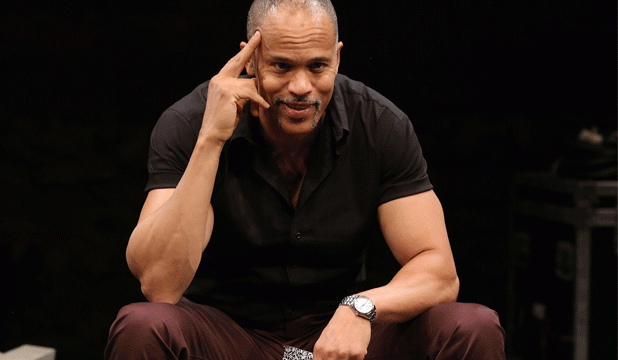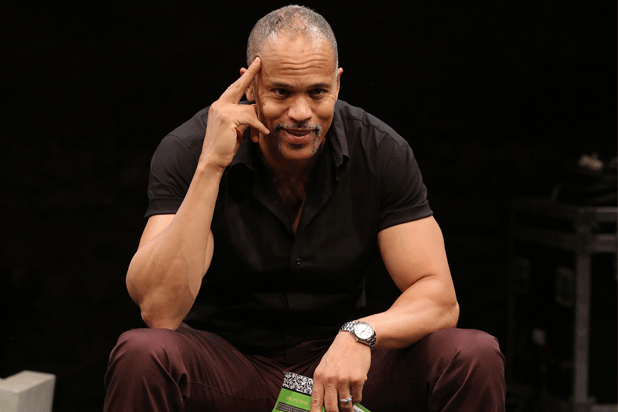in his fiery new play, Keith Hamilton Cobb unleashes on everything when told how to play Othello
Photo: Carol Rosegg
What’s it like for a female actor to be directed by a man? Or a gay actor to be directed by a straight? Keith Hamilton Cobb examines his decades-long career as an African-American actor being directed by white men. The result is his fiery new meltdown of a play, “American Moor,” which opened Sunday at the Cherry Lane Theatre and presented by the Red Bull Theater.
Cobbs plays himself, or someone simply credited as “an actor,” and Josh Tyson plays “a director,” who speaks from the audience and doesn’t appear on stage until the curtain call. “American Moor” simulates an audition for the title role in Shakespeare’s “Othello,” and things don’t go well between this particular actor and director. Actually, most of “American Moor” is not what takes place in an audition but rather in the actor’s head after he’s given directorial suggestions on how to perform the role in question. Since Cobb has clearly been here before, many times, a racially tinged remark from the director sends him off into long hallucinatory analyses of white patriarchy, black abeyance, the Method, truncated rehearsal schedules, the mid-Atlantic accent and directors who think they can read the Bard’s mind a few centuries after the fact. Cobb offers up a scrambled reality, and his performance is enhanced by Wilson Chin’s set, Alan C. Edwards lighting, Christian Frederickson’s sound design, and Kim Weild’s always fluid direction.
This surreal tour of an actor’s mind begins even before we hear Tyson’s voice. Cobb kicks off “American Moor” by having one of those awful arguments we all have with an imaginary foe to relive the most demeaning moments in life. Cobb delivers snippets of dialogue from dream roles that the powers that be never want him to perform, like Queen Titania in “A Midsummer’s Night Dream,” not to mention Hamlet and Richard II, but that ubiquitous director/drama teacher in his head wants him to audition instead for Aaron the Moor in “Titus Andronicus.”
The few scenes where Cobb and Tyson actually speak to each other are very “me king, you puppet” and the “American Moor” could use more of them. Tyson’s director is entitled but also courteous, even-tempered, and he gives Cobb the time, if not the figurative space, to audition. He’s no Otto Preminger, although his suggestion to interpret Othello as an obsessed Lisa Nowak, the diaper-wearing astronaut (Google her, if you must), is so off-the-wall that you know Cobb didn’t dream up such absurd episode. He must have experienced it first hand.
At one point, Cobb’s actor identifies himself as being fifty-two years old. He’s finally the right age to play Othello, after years of being told that one day he’ll make a great Othello, as if that’s the only role he’s been waiting to play after marking time with his Walter Lee Younger, Troy Maxson, or some abomination written by Tyler Perry. Cobb’s middle-aged actor isn’t going down without a fight, and his stretch shirt and tight khakis (costume design by Dede Ayite) let us know he’s willing to play up a black stereotype, if that’s what it takes.
Regardless of his talent and buff physique, Cobb remains a middle-aged actor, and the current explosion of plays by black writers, most of whom are a decade or two younger, appears to have passed him by. “American Moor” doesn’t mention this new body of plays, but ageism is the other brick in the roadblock surrounding Cobb.
In New York City, this year alone has seen the local or world premieres of Aziza Barnes’s “BLKS,” Jordan E. Cooper’s “Ain’t No Mo’,” Lydia R. Diamond’s “Toni Stone,” Jackie Sibblies Drury’s “Marys Seacole,” Jeremy O. Harris’s “Daddy,” Michael R. Jackson’s “A Strange Loop,” Lynn Nottage’s “The Secret Life of Bees,” Dominique Morisseau’s “Ain’t Too Proud,” Suzan-Lori Parks’s “White Noise,” Tori Sampson’s “If Pretty Hurts Ugly Must be a Muhf-a,” and Loy A. Webb’s “The Light.” Among these new dramas and books for musicals by African-American writers, there are at most three male roles (and supporting roles, at that) for an actor who’s plus 50. “American Moor” is the first, so far this year, to give an actor like Cobb his due. It says much that he had to write it himself.
Source: Read Full Article

